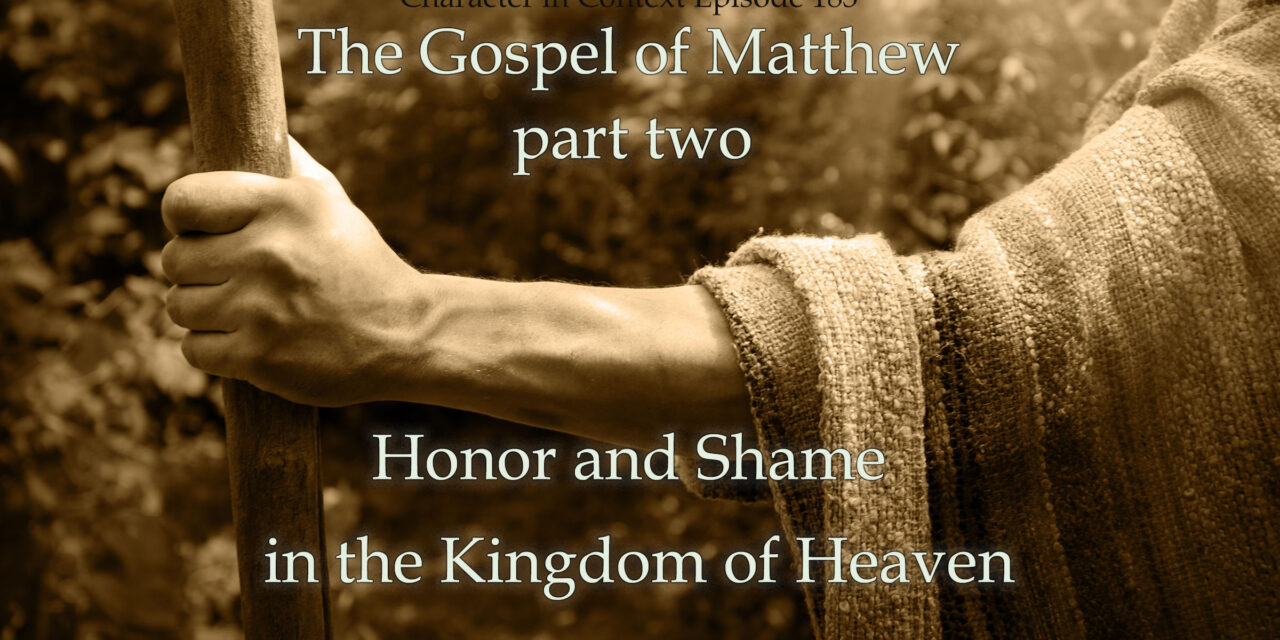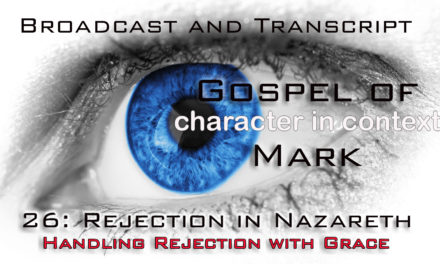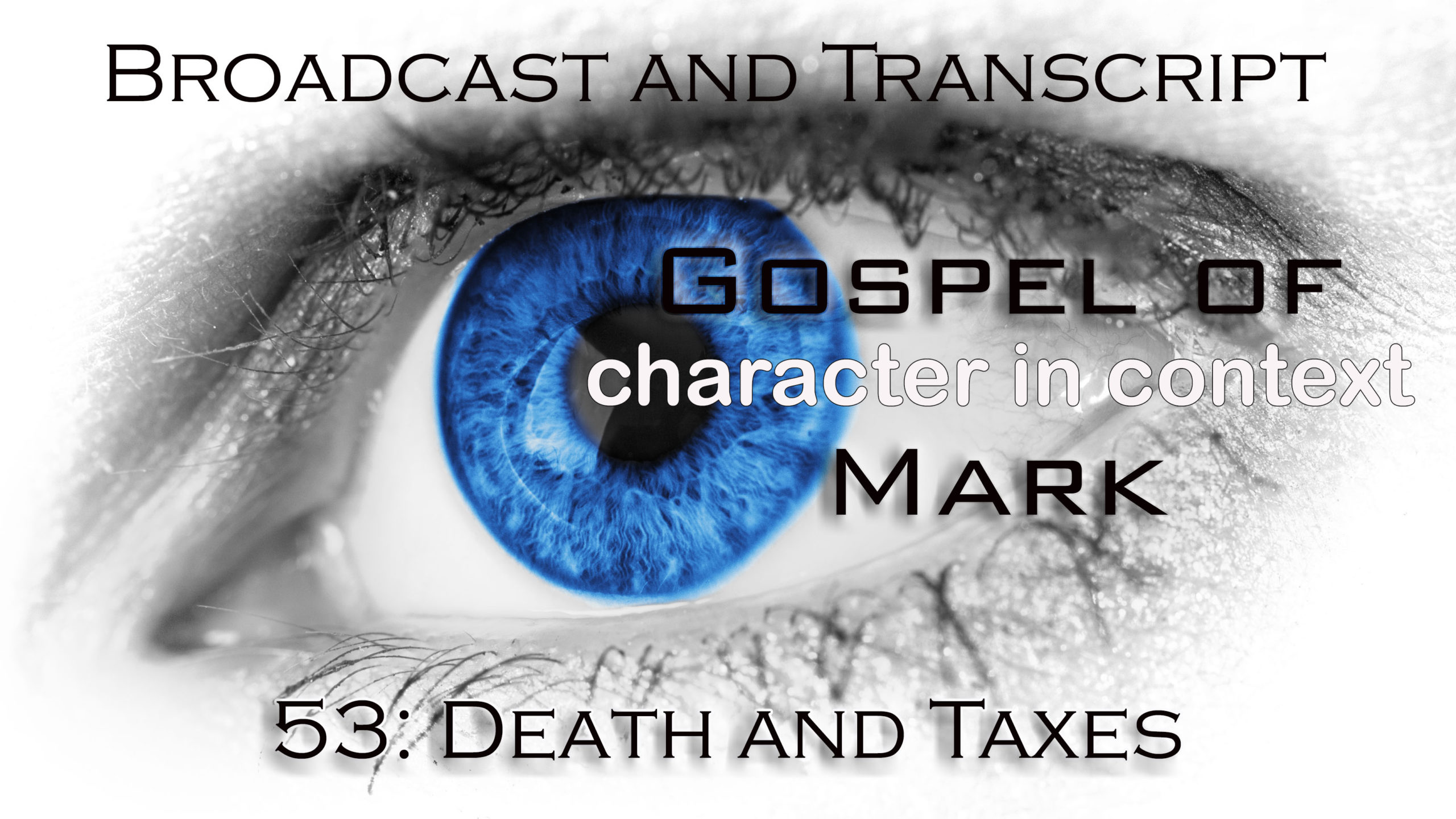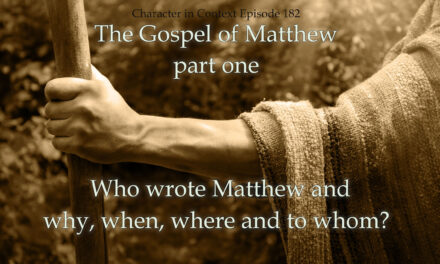What is the Kingdom of Heaven and how does it differ (if at all) from the Kingdom of God spoken of by Mark and Luke? How is it to be compared with the Kingdom of the Beast and the worldly systems of honor and shame culture?
If you can’t see the podcast player, click here. Click here for YouTube version.
The writer of the Gospel of Matthew, whom we are assuming to be either Matthew the apostle or someone to whom he passed his memories (see last episode for that), loved using the phrase “the Kingdom of Heaven” unlike Mark and Luke who used “Kingdom of God.” Mark and Luke certainly weren’t eyewitnesses, but it is believed that Mark passed on Peter’s account and Luke conducted “a thorough investigation” before setting out what he called an “orderly account.” Is there any real difference between the Kingdom of Heaven and the Kingdom of God? Is it just semantics? Are they perhaps equivalent? Matthew used about 90% of Mark’s material for his Gospel but expanded upon it greatly, treating it very much like a summary. He rearranged the material into different groupings to tell the story he wanted people to hear—that Yeshua/Jesus was the second Moses, greater than the Temple, greater than the prophets, greater than his ancestor David, and the definitive word of God in laying out what the Kingdom of Heaven is supposed to be in the lives of his disciples.
Hi, I am Tyler Dawn Rosenquist, and welcome to Character in Context, where I teach the historical and ancient sociological context of Scripture with an eye to developing the character of the Messiah. If you prefer written material, I have years’ worth of blogs at theancientbridge.com as well as my six books available on Amazon—including a four-volume curriculum series dedicated to teaching Scriptural context in a way that even kids can understand it, called Context for Kids (affiliate link). I also have two video channels on YouTube with free Bible teachings for adults and kids. You can find the links for those on my website. Past broadcasts of this program can be found at characterincontext.podbean.com, and transcripts for most broadcasts at theancientbridge.com. If you have kids, I also have a weekly broadcast where I teach them Bible context in a way that shows them why they can trust God and how He wants to have a relationship with them through the Messiah. I am putting together a book list of my resources for this series, which I should have done soon. I have a bazillion books on Matthew.
Matthew uses the phrase “Kingdom of Heaven” thirty-two times in thirty-one verses. No one else uses it at all. They will use combinations of those words in various ways, but never as the Kingdom of Heaven. Obviously there is a reason for this but what we don’t have is an explanation for it in the text. To understand the reasons, we need to remember a few things. Last week we talked about how different Matthew’s original audience was from Mark’s. From Mark’s placement geographically (in Rome near the end of the life of Peter or shortly after) and his use of Latin loan words and concepts, it is evident that he was writing for the predominantly gentile but mixed Roman churches. For Mark, to write of the Malchut HaElohim (Kingdom of God) made a lot more sense than teaching about the Malchut HaShamayim (Kingdom of Heaven). The Kingdom of God didn’t have the theological baggage and expectations among former idolaters that the Kingdom of Heaven would have. For Mark’s audience, with no separation between secular and religious life at all, to speak of the Kingdom of God infiltrating this world through the reign of Yeshua/Jesus would be easier to unpack and maintain than ideas of the Kingdom of Heaven—where the idea of Heaven meant something entirely different within Greek philosophy.
Matthew, on the other hand, was a Jew’s Jew—writing from the vantage point of and to other Jews from either within or close to the Holy Land. In any event, his context was not from the diaspora communities (a word meaning the Jewish communities outside of Roman Palestine), but as one who could “speak the local language” with ease and without feeling the need to explain things that Mark takes the time to explain. Different audiences have different needs and different baggage that needs to be unpacked. With Mark’s audience, for example, it was enough for them to understand that the Pharisees were a sort of religious philosopher’s group. But for Matthew, it was important for his audience to see the Pharisees as the heads of a rival school of thought in opposition to many of the core teachings of Yeshua. This is what would be called sectarian rivalries where one sect of Jews is battling another sect of Jews for supremacy. This is not a battle of Gentile religion vs Jewish religion. This represents the sometimes bitter infighting within a larger group and so this Gospel is where we see polemics (frankly, insults) and their worldviews in collision even though the two groups agreed more than they disagreed on many things. This is a family argument, and with Thanksgiving coming up, you understand what I am talking about.
And so, what appears to be perhaps the dueling concepts of God versus Heaven, we simply have different ways of expressing the same idea—namely, the reality that the reign of God is making some huge changes and is infiltrating the Kingdoms of this world or what Revelation calls the Kingdom of the Beast, aka Empire. Never forget that our God is a God of, “Behold, I do a new thing” (Is 48:6). According to Craig Keener, and I am linking a short video from his excellent website in the transcript, we have these dueling concepts in which we have the Kingdom of Heaven here but also not yet here—where God reigns through Yeshua now but not without opposition—while we look forward to the world to come where Yahweh reigns unchallenged. Kingdom here, in the Greek, simply refers to reign, rule and/or authority. And both Heaven and God were used in those days as a substitution for the divine name, which was no longer spoken outside the Temple, and then only coming from the mouths of the priests in delivering the Aaronic blessing. Occupation by first the Babylonians, followed by the Medes, Persians, Greeks, and Romans changed how freely they wanted to use the Name of Yahweh, fearing that it would fall into common and blasphemous use among the Gentiles. I mean, can you blame them? Totally understandable.
In the mouth of Yeshua, the Kingdom of Heaven becomes synonymous with the sort of world and society where God truly reigns over His people in justice and righteousness, both internally and externally, where we become salt and light, humble and peaceful, meek and generous, self-sacrificing and utterly counter-cultural. The Kingdom of Heaven is an upside-down world where nothing that the empires of the world do make any sort of sense, and where the violence of the strong is overcome by the gentleness of the weak. It should shock no one that Matthew was, by far, the most popular Gospel in the early Church—until Constantine gave Christianity legal standing and Augustine proposed the doctrine of “just war.” The early church survived persecution and resisted empire while taking the Sermon on the Mount very seriously not as pie in the sky ideals but commandments, and it wasn’t until the Church had an army that we became enamored with the safety that comes with a sword in hand. Modern Christian nationalism and every pre-emptive violence mantra we have is the inheritance of Constantine and Augustine, not the Gospels. People like to blame Constantine for everything he didn’t do but miss this really anti-Gospel pro-Empire event. Mostly because it appeals to our fears.
Yeshua was speaking to a Jewish audience that was itself the inheritor of a long history of violence in one form or another and they were longing for the day when the Davidic Messiah would come and lead the Jewish people to victory over all oppressors, both foreign and domestic. Like all worldly empires, including our own, they wanted peace but with themselves at the top of the heap. They wanted their own Kingdom, with their own laws, their own God, and the freedom to practice their form of Judaism (although, in the first century there were endless disputes between factions as to what that should look like). They longed for the Kingdom of Heaven/God, certainly, but as with all of us they also wanted a situation that would appeal to their immediate concerns for safety and security. Nothing Yeshua ever preached aligned with what any oppressed population would be longing for. Serving and blessing enemies—and even praying for them—instead of vanquishing them. The last thing a long-oppressed population wants to hear is that God’s Kingdom isn’t dedicated to destruction of enemies but to their salvation. I mean, seriously, even non-oppressed peoples like my own don’t much care for it. We are a bloodthirsty bunch who naturally desire domination and someone (or many someone’s) to lord authority over. We love Empire as long as it is an empire that privileges us over our enemies. Their motto might as well have been Make Israel Great Again because that historically has always been the mantra of empires. Empire promises safety and security and we prefer it to a Kingdom ruled over by a slaughtered Lamb who is telling us that to follow Him, we have to take up our own crosses. And this is precisely the story Matthew tells about the Messiah—He has come but he isn’t the Messiah anyone wanted. He doesn’t even come across as tough as He did in Mark’s Gospel where He was kicking demon butt and even taking names (bad Legion joke, sorry not sorry) because that isn’t his focus and frankly, it’s already been done by Mark. Matthew’s Messiah is not easy for ancient or modern-day “manly-men” to take pride in or to associate with. His demands are at odds with every world power and the glorious dreams of every human heart. But in Matthew, we hear the story of the Messiah and the Kingdom that the world needs. We see that those institutions we most cherish and depend on for peace and security (be it military, financial, or judicial) do not reflect the values and ways of the Kingdom of Heaven. In other words, there is truly no such thing as a Christian nation because we are all compromised by the demands of empire from the beginning. From Babel.
The Pharisees, scribes, and chief priests are on display as a huge part of what makes Empire work. Pharisees can be followers of Christ and many will be, but they must renounce the post-70 CE Pharisaic push for dominance over the hearts and minds of Jews in the post-Temple world. The way of the Lamb is the only way, and it is not a path of domination or meticulous Hellenistic-style commandment keeping. It is instead a way of wisdom married to love, producing the sort of fruit which always demands behavior that goes above and beyond the commandments given to their ancient Near Eastern ancestors. In the Kingdom of Heaven, if one loves perfectly and self-sacrificially, then the commandments have nothing to teach. But we will get to that when we cover the concept of Yeshua as the Greater Moses.
Historical saving actions are evidence of the otherwise unseen Kingdom of Heaven—including but not limited to the working of miracles. Fulfillment of predictive prophecy is another form of evidence and Matthew will be making use of these proofs as well. Of course, Mark also did this to prove that the Kingdom of God had been inaugurated in a here/not yet sort of way. It’s a huge part of every Gospel account—as is the enthronement of Yeshua at the crucifixion. There can be, after all, no kingdom without a king and with Yeshua as King of kings and Lord of lords, true Israel becomes a theocracy once more as in the days before the selection of Saul, David and Solomon. In Tolkien terms, it’s a Return of the King situation—but a here and not yet return. Like Aragorn, Yeshua is working behind the scenes in exile until the time arrives for His formal coronation.
The arrival of the Kingdom of Heaven, at long last, meant that the old order of Empire was being replaced by the new order of true Justice and Righteousness where honor and shame would be reckoned differently than they had been in the past. Up until this point, from the ancient Near Eastern world of Abraham to the first-century world of Yeshua, the concept of honor (aka renown) and shame (aka public disgrace) had been largely following the same exact rules of the nations around them. Men were expected to maintain family honor through being physically, verbally, and sexually aggressive, unforgiving, unmerciful, and unyielding whereas women spent their lives actively avoiding shame, which (unlike men) could cost them their lives. It was an extremely stressful existence and much time, effort, and scheming were required to remain at the top of the honor heap. It made for a treacherous existence, for sure, and was a contributor to what the later Rabbis would call the “gratuitous hatred” among the Jews of the pre-70 CE Jewish world. Jockeying for honor status was the source of a great many social evils between men and between families—from slander to lust to divorce to unending vengeance with women and children often caught in the middle and sometimes used as pawns.
I have written and taught about Honor and Shame Culture many times so I will only devote a few pages to how it will impact our understanding of the Gospel of Matthew. In the ancient world, honor (renown/social standing) was seen as a “limited-supply” commodity. If I get more then it had to come from someone else, and now they have less. There was only so much to go around within a community, and honor rating was incredibly important. Honor in those times was not about virtue or being a good person—it was about your power and respect rating within the community. As I tell the kids when I teach it, a man could be a total skunk but if he had money and didn’t get it through collaborating with the Romans, or if he was a great warrior or athlete or debater, then he had a high honor rating. It’s why Yeshua could shut down His enemies because every time He answered well, a portion of their honor transferred to Him and they would only ask when they had something to gain. He made their debates extremely expensive. When He worked miracles and the people were dazzled, he gained more honor status. When we see phrases like, “Everything He did pleased them,” or, “the leadership wanted Him dead” it was usually about their star falling and His rising. Honor was like credit—it opened doors. Shame closed them in your face. And yet, this is the upside-down way of the Kingdom. Yeshua does go out getting honor for Himself just by being Himself, in order to glorify the Father, okay? He finishes the fights and traps instigated by others according to the social rules of that time and place. But He dies so shamefully that only Resurrection could salvage the situation, giving Him even more honor than He ever had even at the height of His popularity in the Galilee.
But in the Sermon on the Mount and elsewhere, Yeshua actively preaches a lifestyle that undermines the worldly honor/shame system. In fact, a big part of the major thrust of the story Matthew tells is the instruction to embrace shame and reject renown. Do not recover your lost honor through revenge but bless the person who has shamed you. Be meek instead of aggressive, even though it will cost your family honor. Follow me, even though it will cost you credibility in the synagogues. Forgive, even though it will cause you to look weak and lower your honor in the eyes of the world but—blessed are you when you do it because you will be honored in the eyes of God because you will be promoting shalom, peace and wholeness, and destroying the chaos that comes with retribution and the maintenance of family honor. Trust God and His Kingdom because all these people who have high honor doing it the Empire way in the here and now already have their reward. Esteem others and not yourselves. The highest will be brought low and the low brought high. The last will be first and the first will be last. If someone wants to take a cheap shot at you (like that backhanded slap) just let them get away with it. Gosh, I had to do that a few times with a guy this morning. Worldly honor doesn’t translate to honor in the Kingdom of Heaven because they are incompatible—diametrically opposed. You can’t go about getting them or maintaining them in the same ways. Yahweh, Yeshua tells us, is interested in a people of faith who leave the getting and defending of honor and vengeance to Him. When we accept that it is Yahweh who causes people to rise and fall and we wait on Him, we are truly allowing Him to be God. And let me tell you that it is a scary way to live. He’s been teaching me to do this since 2004, to varying degrees of success, and it really goes against everything I was ever raised to believe I should do.
But I can also tell you something you may already know—every time I have been subjected to or have seen abuse within a religious setting (with the exception of the sexual harassment in the SBC), it has been because someone who had power felt threatened and decided to protect themselves even when there was no cause for them to feel threatened. Maintaining power, control, and image are the ways of the world in protecting worldly honor as opposed to what we must refrain from in growing in Kingdom honor. Retaliation is of the world, patience and grace is of the Kingdom and very few situations in life are so severe that they would actually require tearing down another brother or sister just to protect one’s own reputation or (more likely) ego. I’ve had people come against me—people with audiences a hundred times the size of my own—but God has taught me how to stand down and trust Him and I have never regretted it. If we believe what we preach and especially what we preach to others and we wish to show that trust in tangible ways, it means that we are going to let just about everything slide and shrug it off. It’s just not worth destroying another one for whom Yeshua died in order to protect our turf. Really, we have no turf worth protecting, and if we do, then we truly can trust God to look out for it. He has a vested interest in keeping the Kingdom-building ministries up and running. The world will keep the ministries that are tearing down the Kingdom running by encouraging the sort of nonsense that Yeshua spoke against throughout the Gospel of Matthew.
All of the Gospels, and not just Matthew, show this honor/shame trajectory of coming from shame, growing in honor, suffering the ultimate shame of what was called the slave’s death of crucifixion, the honor reversal of resurrection, and the glorification of the Son in sitting at the right hand of the Father. We are also called to notice this in our own lives as we emerge from the disgrace of being enslaved to sin and death, unable to do anything about it, to our association with the shame of the cross which inaugurates us into the honor of the adoption as sons, and participation in the sanctification that changes us from glory to glory until at last we are vindicated in our own bodily resurrections to rule and reign with Him. This was the good news, that Yahweh had entered into this reality in the form of the Son of Man—completely overturning and destroying the logic of this world, including its methods of assigning what it honorable and what is shameful.
The opening chapters of Matthew, in like manner, were written to show the honor of Yeshua even in terms of the ways of the world—portraying Him as the true heir of David as adopted into the kingship line without coming through the cursed Jeconiah. Joseph, His adoptive father, was a righteous and honorable man, entrusted and visited by angels twice in dreams. His mother was a righteous virgin of the House of David, impregnated by the Holy Spirit. Sages from the East heralded Him as King of the Jews, following after a celestial event, and paid tribute to Him as foreign dignitaries would. And yet, the family was poor and the details of His origins a bit sketchy. But Matthew turns it all into encomium, the ancient art of giving someone an honorable and exceptional birth story the likes of which are only to be found in the stories of great men and demi-gods. It comes across as though Yahweh is mocking what the world considers to be great by presenting this story of true greatness wrapped up in the trappings of humility and poverty and obscurity. Yeshua is, from the start, the unlikely Messiah before becoming the uncomfortable Messiah and then finally the unwanted Messiah. But such are the upside-down honor/shame dynamics of the Kingdom of Heaven.
Next week, we’ll talk briefly about Yeshua as the Greater Moses, Temple, Jonah, Torah, and all that jazz.





















